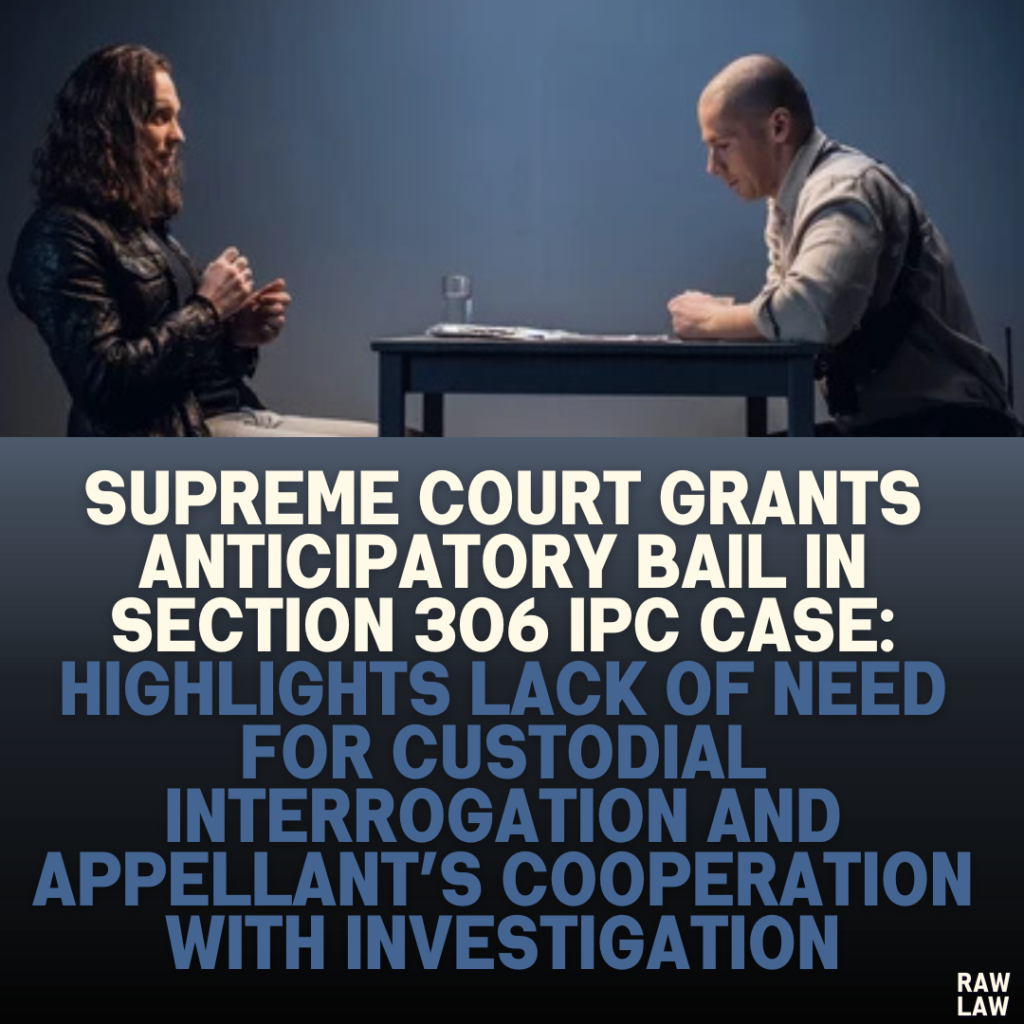Court’s Decision:
The Supreme Court of India allowed the appeal against the rejection of anticipatory bail by the High Court of Punjab and Haryana. The Court directed that the appellant be granted anticipatory bail in connection with FIR No. 13 dated 14.02.2023, registered under Section 306 of the Indian Penal Code (IPC). The Court made it clear that the bail would be conditional, and the Trial Court would impose necessary terms to ensure compliance. It also clarified that the respondent-State could seek cancellation of the bail if the conditions imposed were violated by the appellant.
Facts:
- Background: The case pertains to FIR No. 13, dated 14.02.2023, registered at Police Station Gharinda, District-Amritsar, under Section 306 IPC, which deals with abetment of suicide.
- Rejection by High Court: The appellant had initially approached the High Court of Punjab and Haryana seeking anticipatory bail, which was rejected by the High Court on 17.04.2023.
- Appeal to Supreme Court: The appellant subsequently filed a Special Leave Petition (SLP) before the Supreme Court challenging the High Court’s rejection of her anticipatory bail plea.
- Interim Compliance: During the pendency of the SLP, the appellant complied with the Court’s directions and joined the investigation. The Investigating Officer later confirmed that no custodial interrogation of the appellant was required.
Issues:
- Whether the appellant was entitled to anticipatory bail in light of the allegations under Section 306 IPC.
- Whether the absence of the need for custodial interrogation could be a valid ground for granting anticipatory bail.
- Whether the appellant’s compliance with investigation orders mitigated the grounds for denying bail.
Petitioner’s Arguments:
- Cooperation with Investigation: The appellant argued that she had fully cooperated with the investigation and adhered to all directions issued by the Court.
- No Custodial Interrogation Required: The Investigating Officer had explicitly stated that custodial interrogation of the appellant was no longer necessary, removing the primary basis for her detention.
- Misuse of Process: The petitioner contended that the denial of bail would result in unnecessary hardship, especially since no further investigation required her detention.
Respondent’s Arguments:
- Acknowledgment of Compliance: The respondent-State conceded that the appellant had joined the investigation and cooperated as required.
- No Objection to Bail: The respondent’s counsel informed the Court that the Investigating Officer had confirmed no further need for custodial interrogation.
Analysis of the Law:
The Supreme Court examined the provisions and principles governing anticipatory bail under the Code of Criminal Procedure (Cr.P.C.) and Section 306 IPC:
- Purpose of Anticipatory Bail: The Court noted that anticipatory bail serves to protect an individual from undue harassment and humiliation in cases where arrest is not justified.
- Custodial Interrogation Requirement: The Court reiterated that custodial interrogation is a key factor in deciding anticipatory bail. If custodial interrogation is not required, the denial of bail serves no investigatory purpose.
- Balance of Interests: The Court considered the balance between ensuring a fair investigation and protecting individual liberties, ultimately deciding in favor of granting bail due to the absence of any compelling grounds for detention.
Precedent Analysis:
Although the judgment did not cite specific precedents, the decision aligns with established jurisprudence on anticipatory bail, such as:
- The necessity of custodial interrogation as a determinant for granting or denying bail.
- The principle that bail should not be denied arbitrarily when the accused has cooperated with the investigation.
Court’s Reasoning:
- No Custodial Interrogation Required: The Court placed significant reliance on the Investigating Officer’s report stating that the appellant’s custodial interrogation was unnecessary.
- Compliance with Investigation Orders: The appellant had adhered to all interim directions, demonstrating her willingness to cooperate with the investigation.
- Conditional Bail: By granting anticipatory bail subject to conditions imposed by the Trial Court, the Supreme Court ensured that the State’s interests in conducting a fair investigation were preserved while safeguarding the appellant’s rights.
Conclusion:
The Supreme Court allowed the appeal, directing that the appellant be released on anticipatory bail in the event of arrest, subject to terms and conditions to be set by the Trial Court. The Court explicitly provided that the State could seek cancellation of bail if the appellant violated any of these conditions.
Implications:
- Reinforcement of Bail Principles: The judgment reinforces the principle that bail should not be denied without strong justification, especially in cases where custodial interrogation is not required.
- Protection Against Arbitrary Arrest: The decision underscores the need to protect individuals from arbitrary and unnecessary detention.
- Guidance for Future Cases: The judgment serves as a reference for future anticipatory bail cases, emphasizing the importance of cooperation with investigations and the irrelevance of arrest when it does not serve the investigation’s purpose.
